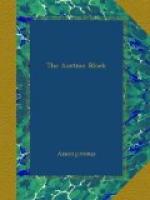It was no difficult matter to chastise Jim, whose spirit was as wretched as his strength; as the wind whips a flag, as a man flaps a dusty garment, so did Bob shake his victim. Jim felt his spine crack and his limbs unjoint. His teeth snapped, he bit his tongue, his heels rattled upon the floor. Bob seemed bent upon shaking the bones from his flesh and the marrow from his bones; but, try as he would, Jim could not prevent the outrage. He struggled, he clawed, he kicked, he yelled; his arms threshed loosely, like the limber appendages to a stuffed figure.
Mr. Armistead, unnaturally pale, remained seated. He emitted harrowing sounds like those made by air leaking into a defective pump. Sullivan looked on with the lively appreciation of a rough-house expert.
When Bob emerged from the rear room he found the barber shop in confusion. Tony was leading a charge at the head of his assistants, who were supported in turn by the customers; but he fell back at sight of the flushed victor.
“It was nothing but a little family affair,” Bob reassured him. “Now, if you please, I’ll borrow a hair-brush.” In front of a mirror he tidied himself, settled his scarf with a deft jerk, then went out whistling. As it was nearly closing-time for the matinees, he strolled toward the Circuit Theater, full of a satisfying contentment with the world. Now that he owed it nothing, he resolved to meet his future obligations as they arose.
Early on Monday morning Bob reported for work, only to receive from Mr. Crosset, whom he had always regarded as a warm friend, the notice of his discharge.
“What’s the matter? Didn’t I make good?” he demanded.
Crosset was a young man; more than once he and Bob had scandalized Broadway; some of their exploits were epic. Now he shrugged carelessly, saying:
“Oh, you made good, I guess; but we can’t take a chance with you.”
“I suppose you’re afraid I’ll steal some of your chalk.”
Crosset grinned, then deponed with extreme gravity: “Bob, you drink. You’re unsteady in your habits. It’s too bad, but we can’t—”
“I don’t drink as much as you do.”
“Nobody does; but that’s beside the question.”
“As a matter of fact, I’ve quit.”
This announcement drew a hearty chuckle. “You’re a great comedian, Bob,” said Crosset.
After surveying his friend for a moment Bob responded with great earnestness: “But you’re not. This fails to hand me a laugh. Now tell me, how did you wet your feet, and whence comes the icy draught?”
“Well, from the direction of Pittsburg, if you must know. It seems you are an undesirable citizen, Bob—a dangerous character. There’s a can tied to you, and we can’t afford to antagonize the whole Steel Trust.”
“I see. I’m afraid I’ll have to disown that father of mine.”
“What’s the trouble, anyhow?”
At Bob’s explanation Crosset whistled. “Funny I didn’t hear about it. Married and happy, eh? Well, I’m sorry I can’t help you—”




